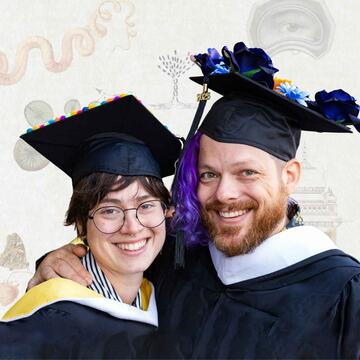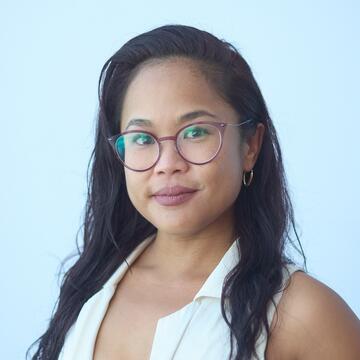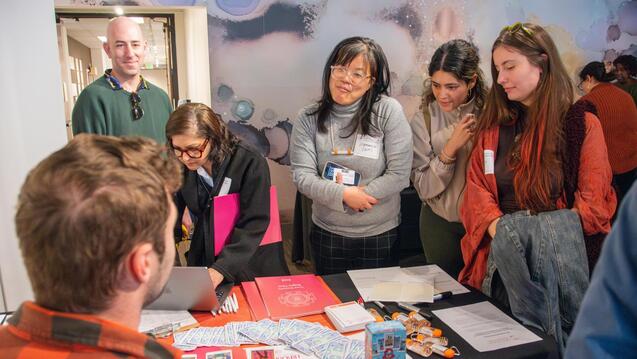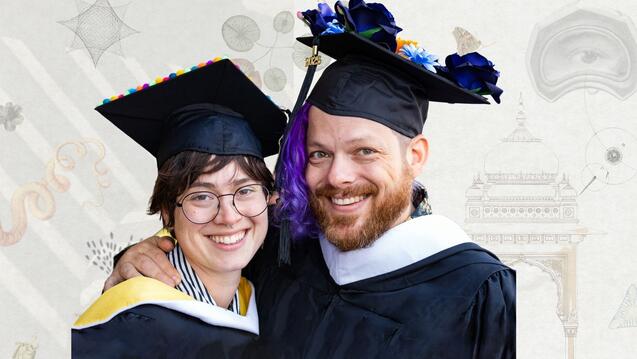
Ph.D. in Philosophy and Religion – Women’s Spirituality
The intersection of feminist, religious, philosophical, and indigenous thought
Program Overview
Our Approach
The Ph.D. in Philosophy and Religion with a concentration in Women’s Spirituality is a rigorous transdisciplinary online program building students towards thought-leadership and propelling change.
We reclaim suppressed knowledge emerging from women and subaltern groups while amplifying the voices of women spiritual leaders, activists, and healers. Our program explores varied spiritual, ecological, and political perspectives rooted in care for the Earth, each other, and the Sacred.
Through your coursework and unique research, you will explore transpersonal and embodied ways of knowing holding womanist, feminist, Indigenous and decolonial lenses.
The program culminates in the creation of a dissertation that hones your unique voice to make an original contribution to the growing body of knowledge of women's spirituality in relation to women's studies, philosophy, religion, ethnic studies, and/or the humanities.
Career Paths
As a doctoral program, all of our students already hold a master’s degree, and many are already situated in a career that is reflected in their dissertation topics. You will have the opportunity to tailor your studies and research to your specific areas of interest, and join our alumni in a wide variety of career options. Additionally, our curriculum includes a course on vocation design to give you the tools for career creation should you like to explore a new direction.
- Academia, research and education
- Policy making and consulting
- Social entrepreneurship
- NGOs and nonprofits
- Creative arts
- Restorative justice, and many more
Curriculum
The Ph.D. in Women’s Spirituality at CIIS consists of 39.2 units and offers three different areas of emphasis: Women and World Religions; Feminist and Ecofeminist Philosophies and Activism; and Women's Mysteries, Sacred Arts, and Healing.
Students select their emphasis upon entry into the program and follow the coursework outlined in the Course of Study below.
Completion of coursework (33 units) is followed by comprehensive exams (6 units) then the completion of an original and substantive dissertation (0.2-0.5 units) that advances the field of women's spirituality. Doctoral dissertations provide advanced students with the opportunity to focus the breadth and depth of their understanding on a topic significant to them and the larger world, making an original, creative contribution of knowledge and insight in scholarship.
We value our community of Women’s Spirituality scholars and offer a range of opportunities to connect beyond curricular activities:
- Community Circles and Program Meetings (online, attendance strongly encouraged; occur 1-2 times each semester)
- Fall Retreats (in-person, attendance strongly encouraged; 4 days in September shortly after the semester begins; no virtual attendance, though some portions might be recorded)
- Spring Retreats and CIIS Commencement (in-person, attendance strongly encouraged and recommended for graduating students and their families & loved ones; 1-2 days in May the same weekend as CIIS Commencement)
- Student-led Community Building Initiatives (in-person and online), which have formed around studying, writing, and activism
Featured Courses
Women and World Religions
This course investigates women in and through the world's religious traditions. We will comparatively look at women's issues, representation, and themes in a variety of cultural and historical contexts through the lenses of the world's major traditions (Buddhism, Islam, Christianity, Hinduism, Judaism) as well as lesser known and Indigenous traditions and cultures from around the globe. Topics include the symbolism of women in religious traditions, construction and control of women's bodies (menstruation, sexuality, birth, gender identity), gendered roles in society, social and religious agency and leadership, and social and environmental justice. Going beyond "official" narratives of various religious traditions, this course also focuses on "othered" traditions and perspectives, investigating points of contention and continuity within and among traditions.
Women’s Sacred Mysteries, Arts, and Healing
Women have served the deities and Spirit in many ways, invoking the divine, celebrating the change of seasons, fostering agricultural rites and urban rituals, stimulating healing, and inspiring the next generations. We learn how women in diverse cultures participate in the Mysteries of life, as priestesses and priests, healers, dancers, praise singers, midwives, daughters, mothers, grandmothers, artists, writers, and actresses of many media. These include sacred song, dance, visual arts, poetry, fiction, theater, and film. We reflect upon the themes that arise from women’s profound rites of passage, including the mysteries of menstruation and conception, sacred sexuality, the sacrament of birth and motherhood, and death/rebirth. We also study various methods and methodologies used in these practices.
Womanist, Feminist, and Decolonial Worldviews
This class examines a diversity of womanist, feminist, mujerista, Indigenous, and postcolonial worldviews, theories, and activism in the United States and internationally. It reviews contemporary international dialogues and postcolonial discourses, along with modern-day and historical womanist-feminist controversies. The reading, discussions, and writing assignments will focus especially on issues related to conflict, race, agency, survival, resistance, intervention, difference, sexuality, class, womanhood, disability, nationality, religion, spirituality, gender, transformation, spiritual activism, and alliance building. Our topics will be explored through diverse texts, including letters, essays, poetry, stories, dance, prayers, and documentary films. This course is centered on the following questions: How have diverse women theorized and resisted systems of sexism, heterosexism, racism, classism, colonialism, and violence? What are the possibilities of dialogue, collaboration, and solidarity among women and men with vastly different backgrounds and worldviews? How is women's spirituality linked to women's social and political lives?
-
I. Required Foundation Courses (21 units)
Critical Thinking and Liberatory Methods
Building Conscious Allyship
Sacred Lineages: Goddesses, Foremothers, and Activists
Women and World Religions
Womanist, Feminist, and Decolonial Worldviews
Women's Spirituality Research Methodologies
Women's Mysteries, Sacred Arts, and Healing
Feminist and Ecofeminist Philosophy and Activism, select one from these options:
Spiritual Activism and Transformative Social Change
Ecofeminist Philosophy and Activism
Women Philosophers, Mystics, and Wisdom Teachers
II. Areas of Emphasis (6 units)
See Emphasis options below.
III. Electives (6 units)
Select any six units from any course in our program or at CIIS. Students are encouraged to take electives in their area of emphasis.
V. Comprehensive Exams (6 units)
Comprehensive Exam: Literature Review
Comprehensive Exam: Advanced Research Methods
VI. Culminating Coursework
Dissertation Proposal Writing: This course may be taken a maximum of three times. Dissertation Seminar
Women and World Religions Emphasis
We review a variety of lineages that document women’s spiritual power and religious experience from the ancient world to the present. The study of women and world religions begins with an examination of the evidence for the transmission of signs and symbols of reverence for a dark mother of Africa to all continents of the world. We explore sacred iconographies and diverse spiritual roles of women around the world and across time, focusing on elemental powers, sacred mothers, Goddess(es), divine ancestors, and other female deities. We survey women’s spiritual roles, rituals, and leadership in historical and contemporary expressions of Judaism, Christianity, and Islam; Hinduism; Buddhism; Taoism; Shinto; paganism; contemporary Goddess spirituality; and more. Canonical and orthodox religious beliefs are studied alongside the subterranean, submerged, and heretical streams that run beneath the accepted doctrines of established religions and are found in the folklore, heresies, and everyday rituals of diverse subaltern and colonized/decolonizing cultures. Women’s spiritual quests and Goddess-God interfaith dialogues are encouraged, and the “sacred feminine” of many traditions is reclaimed and honored, through Goddess studies, modern matriarchal studies, women’s spiritual quests, and sacred pilgrimages.
Feminist and Eco-Feminist Philosophy and Activism Emphasis
Feminist philosophy has long emphasized a relational approach to key philosophical issues. This approach seeks to be holistic, moving beyond reductionist and mechanistic, absolute hierarchical dualisms to reconstitute and generate a worldview of dynamic interconnectedness in the web of life. Ecofeminist philosophy explores the embodied, embedded, ecosocial context of philosophical issues, with attention to the evolving field of relational or holistic thought. Courses include topics such as diverse ecological/Indigenous feminisms; spiritual activism and models of justice; animal rights and ethics; multicultural feminist theory; womanist/feminist philosophers, mystics, and wisdom teachers; and process philosophy and process theology/thealogy. We combine feminist and womanist analysis and vision—in regard to social, political, and economic systems—with an engaged spirituality that draws on active compassion to create a more equitable, caring, and sustainable world.
Women's Sacred Mysteries, Arts, and Healing Emphasis
The experiential as well as intellectual study of diverse sacred arts is intended to evoke one’s innate creativity, revealing personal and cultural sources of mystical insight, embodied healing, and artistic blossoming. Our program includes an emphasis on the embodied wisdom of women and other subaltern populations, and we focus on the vernacular history that preserves the role of women and other oppressed genders who have served as seers, healers, and nurturers of life. Many elements of language, ritual, and the arts have roots in cultural responses to the elemental powers of nature, the ineffable mysteries of the cosmos, and the primal characteristics of the female body. We honor the mysteries of birth, sexuality, death, and rebirth. Courses include modes and powers of healing utilized by women, populations of color, queer peoples, and other subaltern populations from a variety of spiritual, sociocultural, and geographic traditions. Topics include issues in women’s health, healing, and wellness; diverse views on women’s and other marginalized genders’ embodiment and sexualities; and experiential studies in movement and bodywork from a variety of traditions.
Entry Requirements
Successful completion of an M.A. is a requirement for admission to the Ph.D. program. An M.A. degree earned in a related field is preferred, but not required. Students admitted with an M.A. in a field other than philosophy, religion, women's/gender studies, or ethnic studies may need to take up to 9 supplemental units from the Women's Spirituality curriculum. If some of the student's masters-level coursework included an examination of gender and/or religion, those courses may count toward the 9 supplemental units.
Required Application Materials
Your application is your opportunity to share who you are. To be considered essays and written responses must be your own authentic work.
Online Admissions Application: Begin the application process by submitting an online application and paying the non-refundable $68 application fee.
Degree Requirement: A bachelor’s and master’s degree (M.A., M.S., or the equivalent) from an accredited college or university.
Minimum GPA: A GPA of 3.0 or higher in previous coursework is required. However, a GPA below 3.0 does not automatically disqualify an applicant and CIIS will consider a prospective student whose GPA is between 2.0 and 3.0. These individuals are required to submit a GPA Statement and are encouraged to contact our Admissions Team to discuss their options.
Transcripts: Official transcripts from all accredited academic institutions attended where 7 or more credits have been earned. Transcripts may be sent digitally to materials@ciis.edu or mailed to CIIS in their official, sealed envelope. Transcripts from institutions outside the U.S. or Canada require a foreign credit evaluation through World Education Services (WES). CIIS will also accept foreign credential evaluations that are in a comprehensive course-by-course format from the current members of the National Association of Credential Evaluation Services (NACES).
Statement of Purpose: People enter our program with diverse academic and professional backgrounds and goals. Please share with us what motivates you and what your goals are during your time in our doctoral program. In your essay, please include the following:
Use this statement to demonstrate your motivation, intellectual readiness, and potential to contribute to your chosen field. Be specific, reflective, and concise. Four-page maximum (typed, double-spaced).
- Research Interests and Goals
- What specific research questions or areas are you interested in exploring during your Ph.D. studies?
- Why are these topics important to you and to the broader field?
- Academic and Professional Background
- How has your academic and/or professional experience prepared you for doctoral-level research?
- Highlight any relevant coursework, research experience, publications, or projects.
- Fit with Our Program
- Why have you chosen to apply to this specific Ph.D. program?
- Which core faculty members, courses, or resources at our institution align with your goals?
- Long-Term Objectives
- What are your career aspirations after completing the Ph.D.?
- How will this program help you achieve those goals?
Admissions Essay: A six-page maximum (typed, double-spaced) short-answer essay questions:
- What inspires you to apply to the Ph.D. program in Women’s Spirituality?
- What does women’s spirituality mean to you?
- What courses or topical areas are you most interested in and why?
- Our program is academically rigorous. What tools have you developed to manage your time, engage in complex projects, and meet deadlines?
- Our program centers collaboration and community. What skills and capacities do you bring to learning in community?
- We value diversity in both identity and perspective. Our community includes people of many different religious, racial, ethnic, gender, national and class backgrounds. Conflicting points of view will emerge in the classroom and community spaces. Tell us about an experience where you encountered conflict in a community setting. How did you navigate this situation? What did you learn from it?
- What inner resources have you developed for handling stress, challenges, and disappointments?
- Tell us about a time when you had to receive difficult feedback on your academic or professional work. How did you integrate this feedback and grow from this experience?
Academic Writing Sample: A writing sample of eight-to-ten pages (typed, double-spaced) that demonstrates your capacity to think critically and reflectively and demonstrates graduate level writing abilities. A sample that uses outside sources must include proper citations. You may submit copies of previous work, such as a recent academic paper, article, or report that reflects scholarly abilities.
Two Letters of Recommendation: Letters of recommendation should ideally be from professors who can attest to your scholarly writing and research abilities. If you are not able to obtain two letters from faculty, one of the letters can be from an academic advisor or professional supervisor. Recommenders should use standard business format and include full contact information-name, email, phone number, and mailing address.
Candidate Selection
Successful candidates for admission into the Women's Spirituality doctoral program typically have the following qualifications:
- The ability to clearly articulate educational, professional, and research goals
- The ability to identify a prospective area of specialization and/or dissertation topic that is consistent with the program's mission and resource
- A vision that is compatible with the program's mission
- A commitment to personal and social transformation
- An ability to think critically and creatively
- Respect for a diversity of viewpoints
- Sufficient maturity and stability to pursue independent inquiry
- Scholarly writing skills
Events and Info Sessions
An Online Overview with Jennifer Gruczelak and Ronda Sharp
Attend our online event on February 21.



Take the Next Step
For over 50 years, CIIS has been at the forefront of education that integrates rigorous science, innovative scholarship, and social justice. You will learn from faculty at the forefront of their fields, local artists and activists, and a community of peers as passionate and dedicated as you. There’s never been a better time to be here – let’s build a healthier and more equitable world.



